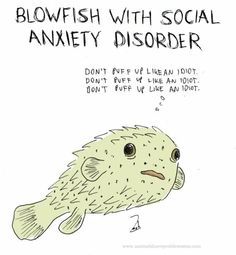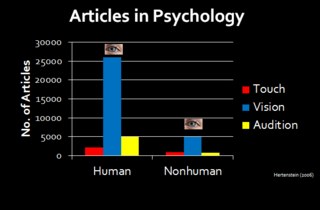New research on the discomfort and avoidance of physical touch
Hell is touching and being touched by other people. This is what we discovered in new research on how people suffering from social anxiety deal with seemingly positive emotional experiences. But before I dive into the details, let me offer insights into a silent epidemic.
Social anxiety disorder is the fourth most common mental health disorder in the United States . Approximately 12 percent of Americans will suffer from this condition at some point during their lifetime. What do people with social anxiety disorder fear?
According to Dr. David Moscovitch at the University of Waterloo when character flaws seem to exist and are noticeable, people lose their courage to pursue meaningful goals. When your monkey brain tells you "I have nothing to say," "I am going to embarrass myself if I speak up," or "Nobody is going to want to hear my story," it can be hard to jump into a social situation. When you believe that your anxiety is uncontrollable and say to yourself, "I am going to sweat profusely," or "Other people will notice how tense my body feels" it seems reasonable to retreat from a social situation.

Source: Felipa Ashburn, used with permission
Scientists have missed the actual problem. For years, scientists presumed that the problem is anxious thoughts, feelings, and bodily sensations that are too intense, frequent, and enduring. But it is normal to feel uncomfortable walking into a party alone. It is unusual to be tranquil when alone in a room of tribes. Our own research has found that healthy adults and people suffering from social anxiety disorder experience nearly identical feelings of social anxiety in everyday social interactions. Where these groups differ is that people suffering from social anxiety disorder are unwilling to experience these normal anxious thoughts, feelings, and bodily sensations. They avoid doing anything that will elevate their anxiety, which means you don't talk to attractive people and you don't talk about provocative topics. They conceal their feelings, which is no different than trying to concentrate over the course of an eight-hour workday while holding in flatulence. By the time you get home, you are a physical wreck and when that gas is unleashed, the dog, kids, and neighbours will be tortured. Because people with social anxiety disorder are unwilling to experience these anxious feelings, they extract less joy and meaning from their social interactions. They smile less. Laugh less. Disclose less. As a result, they experience deficits in positive emotions and empty conversations.
We discovered a new emotional difficulty linked to social anxiety: physical touch. What is interesting about physical touch is that scientists neglect this sensory modality. Compared with sight and hearing, only a small number of scientific articles exist on touch.
Source: Matt Hertenstein, used with permission
This is surprising because touch is an invaluable way to communicate to another person. Hugging people you care about. Rubbing someone's head after they nail a basketball shot. Shaking hands after settling an argument. Giving or getting a massage. Enjoying a healthy sex life with yourself or preferably, a partner or two or 15.
While scientists have discovered a great deal about how people with social anxiety problems perceive their social world and behave within it, surprisingly little is known about their romantic relationships.
Consider the following scenario. Jack is a socially anxious man who frequently feels awkward in social interactions. He also avoids shaking hands or any form of close physical contact with other people. But with his long-term girlfriend, Diane, he enjoys socializing and tends to communicate his positive emotions when together by frequently touching her arm. Positive emotions can be communicated accurately between people via touch (Hertenstein, Keltner, App, Bulleit, & Jaskolka, 2006) and such behavioural expressions are indicative of healthy relationships (Field, 2014). Thinking of this example of a highly socially anxious man (Jack) and non-anxious girlfriend (Diane), how might social anxiety within a relationship influence attitudes about, and willingness to engage in, physical contact?
This was our research question. To test it, we studied 128 heterosexual romantic couples. Prior research suggests that for those high in social anxiety, romantic relationships are characterized by frequent, intense negativity and deficits in positivity. Our study demonstrates one key mechanism through which these problems may arise: discomfort with and avoidance of touch.
High socially anxious individuals felt discomfort being touched and touching other people, with a strong tendency to avoid physical contact. But this story would be misleading if we did not explore the differences between men and women.
When high in social anxiety, women, but not men, experienced more discomfort being touched and more avoidance of physical contact. Also, the effects of being paired up with a socially anxious romantic partner on the discomfort and avoidance of touch was more powerful and robust for men, compared to women. Women drive the link between social anxiety and touch in romantic couples. But why?
Perhaps non-anxious women are more likely than men to offer therapeutic experiences for their partners via various nurturing behaviours and expressions of empathy, including physical touch. We refer to this as a Florence Nightingale Effect wherein the non-anxious partner engages in excessive nurturing, with a preference for being needed in a helper role; this would benefit the non-anxious partner as a high socially anxious partner would be dependent on them, increasing a sense of safety/security. While this dynamic may promote healthy attitudes toward touch, it is unclear whether these relationships are truly healthy, particularly for women. A recent study suggests that parents with high levels of empathy for their depressed children produce more inflammatory cytokines than less empathic parents (Manczak, Basu, & Chen, 2016 . Perhaps non-anxious women experience compromised immunological functioning as a result of the mental demands of managing the emotional and social difficulties of romantic partners. What I love about this study is that it only leads to more questions. We need to know more about the psychological profile of emotionally healthy partners who settle into romantic relationships with highly anxious individuals.
Social anxiety disorder is a common problem with serious psychological consequences. This new research draws attention to positive emotional deficits. Highly socially anxious people desire social acceptance and intimacy, but their discomfort and avoidance of physical touch is a mechanism that prevents them from accomplishing these goals.
Only by exploring close relationships can we determine whether the greatest source of well-being is a source of pain for certain individuals. Only by exploring both members of a close relationship do we gain a comprehensive portrait of relationship difficulties and resilience. By exploring the portals to pleasure and intimacy, such as physical touch, we will learn where to intervene. It is unacceptable to let 12% of the population suffer in silence. Thankfully, scientists are continually discovering new ways to prevent and treat social anxiety problems. If we do treat these emotional difficulties, reducing anxiety is insufficient. The goal should be to help them lead a good life, filled with moments that are revitalizing or opportunities to make a meaningful contribution while being surrounded by people they cannot get enough of.
For more information on treatments, download this great review .
For more on the research presented in this blog post, read the full article:
Dr. Todd B. Kashdan is a professor of psychology and senior scientist at the Center for the Advancement of Well-Being at George Mason University. His most recent book is: The Upside of Your Dark Side . For speaking engagements or workshops: toddkashdan.com
googletag.cmd.push(function() { googletag.display('div-gpt-ad-1410300134704-0'); });
googletag.cmd.push(function()
{
googletag.display('div-gpt-ad-1410300134704-1');
});

